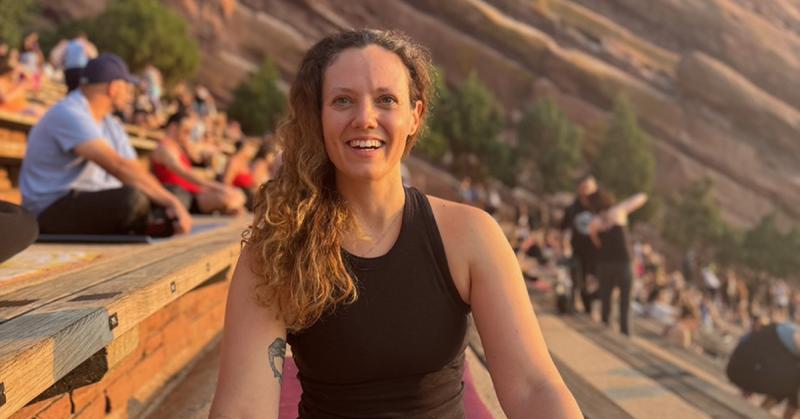Field Spotlight
Field education partner Comeback Yoga provides free trauma-informed yoga classes to the military community

Although Caitlin Sturgis loved her career fundraising for nonprofits, including for the University of Denver, she decided to change paths and pursued an MSW with the goal of making a more direct impact on people who needed support and healing.
Inspired by a chapter about yoga in Bessel van der Kolk’s book “The Body Keeps the Score,” Sturgis began studying yoga as a healing modality. Although she did not have much yoga experience, she recalls thinking, “I can’t do anything about this right now, but I could at least learn.” Sturgis started studying yoga with the intention of becoming an instructor, completing 200 hours of yoga training and enrolling in the Graduate School of Social Work MSW@Denver online MSW program.
As an MSW student, she completed her concentration-year field placement as an instructor for Comeback Yoga, a nonprofit that provides free, accessible, trauma-informed, science-based yoga classes to the military community to enhance overall health and quality of life. One of the organization’s initiatives is offering yoga classes for a residential rehabilitation treatment program for veterans with mental health conditions including posttraumatic stress disorder. As an instructor for the clinic, Sturgis taught yoga and introduced participants to grounding, mindfulness, breath awareness and other techniques to help balance and regulate the nervous system.
Sturgis says, “This curriculum was designed to ensure that every student who comes to the treatment program gets a full toolbox and good introduction to trauma-informed therapy and has the ability to practice it, and get the benefits of yoga.”
The program is intentional about its trauma-informed approach. For instance, unlike a traditional yoga class, there are no hands-on assists, and the instructor stays in their space rather than roaming around the room to offer corrections. Sturgis says power-sharing is important as well. She explains, “I give choices throughout the practice; it’s all optional, and [participants] understand they don’t have to do what I’m doing. They have agency.”
Sturgis adds, “Trauma-informed yoga is hoping to address trauma from the bottom up, from the body, and reframe the process.”
The clinic enrolls participants on a rolling basis. Thus, Sturgis could be teaching classes that include new participants and those who are nearing graduation from the 6-week program. Sturgis had not previously worked with veterans and notes, “It’s the hardest yoga class I’ve ever taught. I don’t think I could have done it without the support of my internship.”
In addition to growing her skills as a trauma-informed yoga instructor, Sturgis also conducted research, evaluation, and wrote grant reports as part of her Comeback Yoga field experience. She says, “The level of support I got in the internship forever changed my level of confidence. My supervisors were intentional about giving me critical feedback and creating challenges that were invitational for me to grow as a yoga teacher.”
Sturgis is graduating this month and will continue as a Comeback Yoga instructor, teaching online and in the PTSD clinic. She says it has been inspiring to see that “change is possible for people who live with PTSD.”
She adds, “The importance of mental health for men is something I’m so honored to work in; I’m really invested in that for our community’s wellness. … Yoga helps us to calm ourselves and show up for [ourselves]. Now for me, yoga is this huge capacity to serve others and to connect, to bring healing to a group setting. Healing happens in communion, and yoga makes it possible.”




